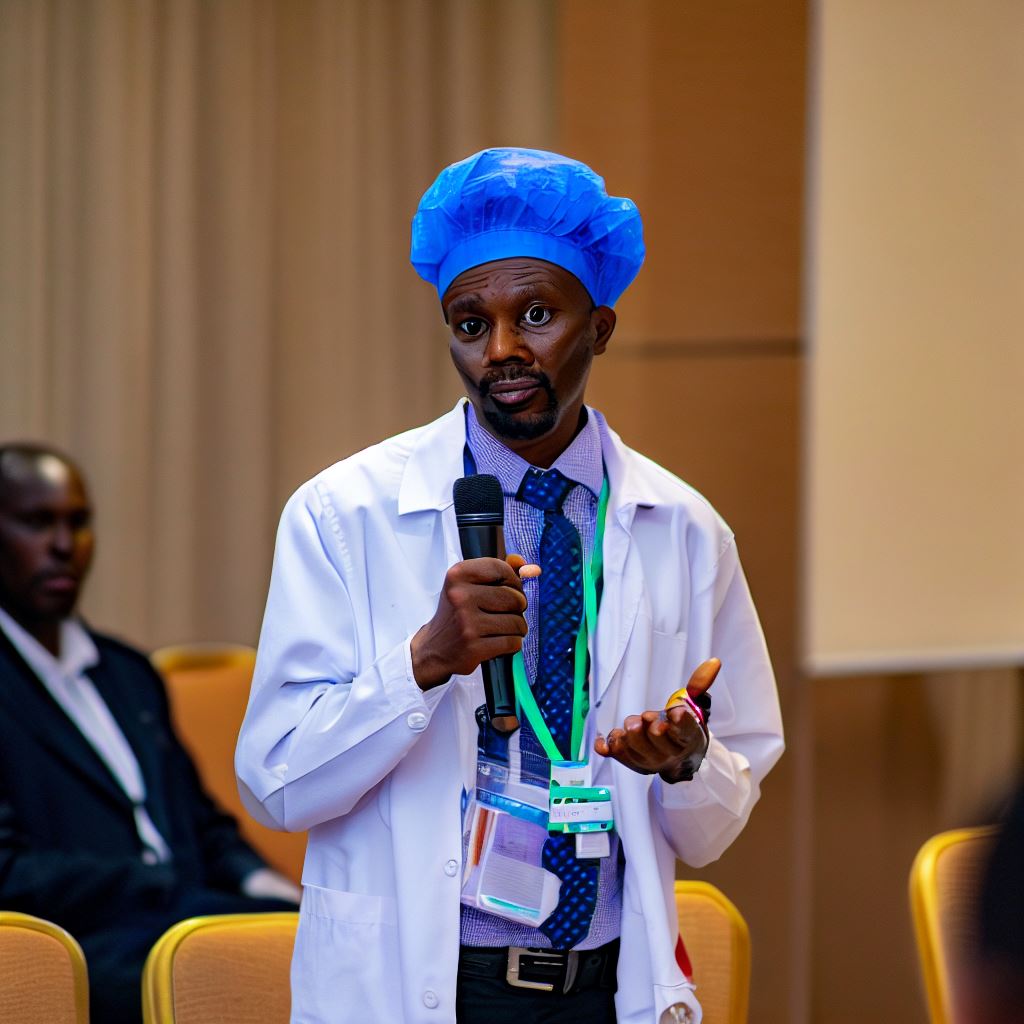Introduction
Epidemiology is the study of how diseases spread and affect populations.
It plays a crucial role in Nigeria, where infectious diseases and outbreaks are prevalent.
Understanding the patterns and determinants of diseases allows for effective control and prevention strategies.
In Nigeria, where diseases like malaria, tuberculosis, and HIV/AIDS are widespread, epidemiology is of utmost importance.
The in-depth knowledge and skills of epidemiologists help in tracking and investigating disease outbreaks, estimating disease burden, and designing appropriate interventions.
The purpose of this blog post is to highlight the skills necessary for a successful career in epidemiology in Nigeria.
These skills include strong analytical and critical thinking abilities, proficiency in statistical analysis, knowledge of research methodologies, and effective communication skills.
Epidemiologists in Nigeria need to be equipped with a thorough understanding of the local context, cultural factors, and healthcare systems to effectively combat diseases.
Additionally, they must possess skills in data collection, management, and analysis, as well as the ability to interpret and communicate findings to policymakers and the public.
A successful career in epidemiology in Nigeria requires a diverse set of skills that encompass both technical expertise and communication abilities.
This blog post aims to provide aspiring epidemiologists with insights into the skills they need to develop in order to make a meaningful impact in public health.
Educational Requirements
A successful career in epidemiology in Nigeria requires specific educational qualifications and a commitment to continuous learning.
Bachelor’s Degree in a related field
Pursuing a bachelor’s degree in a related field, such as biology or public health, is the first step towards a career in epidemiology.
This foundational education provides a solid understanding of basic scientific principles.
Master’s or Doctorate Degree in Epidemiology
To specialize in epidemiology, it is crucial to obtain an advanced degree such as a Master’s or Doctorate in Epidemiology.
These programs offer specialized coursework and research opportunities in the field.
Importance of continuous learning and staying updated in the field
Epidemiology is a constantly evolving field with new diseases, research methods, and analytical techniques emerging regularly.
Therefore, continuous learning is essential for success.
Epidemiologists must stay updated with the latest research, attend conferences, and engage in professional development activities.
Epidemiology is a multidisciplinary field, and having a solid educational foundation is vital to excel in this career.
Students gain a broad science understanding with a bachelor’s degree. An advanced epidemiology degree imparts specialized skills for research.
Throughout their education, aspiring epidemiologists learn various key concepts, including study design, data analysis, statistical methods, and disease surveillance.
These skills enable them to investigate patterns of disease occurrence and distribution, identify risk factors, and contribute to disease prevention and control efforts.
Furthermore, pursuing a Master’s or Doctorate degree allows individuals to gain practical experience through internships, fieldwork, and research projects.
These experiences help aspiring epidemiologists apply their theoretical knowledge to real-world situations, enhancing their problem-solving and analytical skills.
Read: The Role of Science in Nigerian Education Policy
Technical Skills
Epidemiology is a critical field in public health that aims to identify and analyze patterns of diseases.
In order to excel in a career in epidemiology in Nigeria, there are several essential technical skills that one must possess.
Proficiency in statistical analysis and data management
Proficiency in statistical analysis and data management is crucial for an epidemiologist.
They must be able to collect, organize, and analyze data using appropriate statistical methods.
This skill helps in identifying patterns and trends in disease occurrences.
Knowledge of research methodologies
Knowledge of research methodologies is essential for conducting epidemiological studies.
Epidemiologists need to be familiar with different study designs, such as cohort studies, case-control studies, and cross-sectional studies.
This knowledge helps in designing and implementing effective research projects.
Ability to use epidemiological software and tools
Ability to use epidemiological software and tools is also necessary for a successful career in epidemiology.
These software and tools provide epidemiologists with advanced data analysis capabilities, graphical representation of data, and modeling techniques.
Proficiency in these tools enhances the quality of research and data interpretation.
Understanding of study design and sampling techniques
Understanding of study design and sampling techniques is fundamental in epidemiology.
Epidemiologists need to know how to select appropriate study samples and ensure representativeness.
This skill ensures the reliability and validity of study findings.
Technical skills are critical for a successful epidemiology career in Nigeria.
Proficiency in statistical analysis and data management allows epidemiologists to uncover patterns and trends in diseases.
Knowledge of research methodologies helps in designing effective research projects.
The ability to use epidemiological software and tools enhances data analysis capabilities.
Understanding study design and sampling techniques ensures the reliability of study findings.
By acquiring and honing these technical skills, epidemiologists can contribute effectively to public health strategies and disease control efforts in Nigeria.
Read: A Guide to Becoming a Hydrologist in Nigeria: Steps
Analytical Skills
In order to excel in a career in epidemiology in Nigeria, it is important to possess strong analytical skills.
These skills enable epidemiologists to make sense of the vast amount of data they encounter and draw meaningful conclusions.
The following skills contribute to the development of effective analytical abilities in the field.
Ability to interpret and analyze large datasets
Epidemiologists often work with large datasets containing extensive information on disease prevalence, risk factors, and demographics.
The ability to navigate, interpret, and analyze these datasets allows for the identification of patterns and trends, which are crucial for developing effective prevention and control strategies.
Skill in identifying trends and patterns
Identifying trends and patterns is a key aspect of epidemiological analysis.
By analyzing data, epidemiologists can identify shifts in disease rates, risk factors, and other indicators.
This information assists in formulating hypotheses and designing studies to further investigate these trends and patterns.
Critical thinking and problem-solving abilities
Critical thinking is vital for epidemiologists, as they constantly face complex problems and uncertainties.
It involves the ability to objectively evaluate evidence, consider various perspectives, and use logical reasoning to draw conclusions.
Epidemiologists must solve problems and make decisions based on available data to protect public health effectively.
Knowledge of statistical methods and data interpretation
A solid foundation in statistics is fundamental in epidemiology.
Understanding statistical methods helps in analyzing and interpreting data accurately.
Epidemiologists must be proficient in statistical techniques such as regression analysis, hypothesis testing, and confidence intervals to assess associations between variables and evaluate the strength of evidence.
Strong analytical skills play a crucial role in a successful epidemiology career in Nigeria.
The ability to interpret and analyze large datasets, identify trends and patterns, think critically, and apply statistical methods enhances an epidemiologist’s ability to contribute meaningfully to public health.
Developing and honing these skills through education, experience, and continuous learning is essential for those aspiring to succeed in the field of epidemiology in Nigeria.
Read: The Role of Science in Nigerian Education Policy
Communication Skills
Effective written and oral communication
Epidemiologists in Nigeria need excellent communication skills to convey information and ideas clearly and accurately.
Ability to present findings and recommendations
They must be able to effectively communicate their research findings and provide recommendations to a variety of audiences.
Skills in writing scientific papers and reports
Writing scientific papers and reports is an essential part of an epidemiologist’s job, and they need to possess strong writing skills.
Collaboration and teamwork skills
Epidemiologists often work in teams and collaborate with other professionals, requiring strong teamwork and collaboration abilities.
Read: Nigeria’s Hydrology Industry: Opportunities and Challenges

Knowledge of Public Health Principles
- Understanding of disease surveillance and outbreak investigation is crucial for an epidemiologist in Nigeria.
- Epidemiologists should possess knowledge of preventive measures and interventions to control the spread of diseases.
- Familiarity with healthcare systems and structures in Nigeria is essential for effective epidemiological work.
Having a successful career in epidemiology in Nigeria requires a range of skills and knowledge.
One of the fundamental aspects is a strong understanding of public health principles.
Epidemiologists play a vital role in monitoring, analyzing, and controlling disease outbreaks in the country.
Here are some key skills that are necessary for a successful epidemiology career in Nigeria:
Understanding of disease surveillance and outbreak investigation
One of the core responsibilities of an epidemiologist is to monitor and track diseases in the population.
This requires a deep understanding of disease surveillance techniques and outbreak investigation methods.
Epidemiologists need to be able to collect and analyze data effectively to identify patterns and trends in disease occurrence.
Knowledge of preventive measures and interventions
Preventing the spread of diseases is a crucial aspect of epidemiology in Nigeria.
Epidemiologists should possess comprehensive knowledge of preventive measures and interventions to control the spread of diseases.
This includes understanding vaccination strategies, health promotion campaigns, and effective messaging to educate the population about disease prevention.
Familiarity with healthcare systems and structures in Nigeria
Epidemiologists need to be familiar with the healthcare systems and structures in Nigeria to navigate the complexities of public health in the country.
They should understand the roles and responsibilities of various healthcare institutions, including government agencies, hospitals, and community health centers.
This knowledge helps epidemiologists collaborate with healthcare professionals and implement effective disease control measures.
Overall, a successful career in epidemiology in Nigeria requires a solid foundation in public health principles.
Epidemiologists need to have a comprehensive understanding of disease surveillance and outbreak investigation techniques, as well as strong knowledge of preventive measures and interventions.
Additionally, familiarity with the healthcare systems and structures in Nigeria is essential for effectively addressing public health issues and collaborating with healthcare professionals.
By acquiring and honing these skills, epidemiologists can make significant contributions to disease control and prevention efforts in Nigeria.
Cultural Competence
Cultural competence is indispensable for a successful epidemiology career in Nigeria.
Ability to Work Within Diverse Communities and Populations
- Effective communication with diverse groups.
- Building trust and rapport.
- Tailoring interventions to specific populations.
Knowledge of Local Customs, Beliefs, and Practices:
- Understanding cultural norms.
- Respecting traditions.
- Integrating local wisdom into health programs.
Awareness of Social Determinants of Health in Nigeria:
- Recognizing how social factors impact health.
- Addressing disparities in healthcare access.
- Advocating for policies that reduce social inequalities.
In Nigeria, cultural competence isn’t merely an asset—it’s a necessity.
It fosters community engagement, improves healthcare delivery, and ensures that epidemiological efforts resonate with the local population.
Building this competence is essential for epidemiologists aiming to make a meaningful impact on public health in Nigeria.
Professional Experience and Networking
Importance of gaining practical experience in the field
- Hands-on experience is crucial for a successful career in epidemiology.
- Practical skills acquired through experience are highly valued by employers.
- Real-world scenarios provide a deeper understanding of epidemiological concepts.
- Applying theoretical knowledge in practical settings enhances problem-solving abilities.
- Practical experience helps develop critical thinking and analytical skills.
- Working in the field allows for exposure to different types of data collection methods.
- Experience enables professionals to contribute effectively to public health policies.
- Practical knowledge complements academic qualifications and increases employability.
- Hands-on experience prepares individuals to handle challenges faced in epidemiological research.
- Practical experience fosters adaptability and the ability to work under pressure.
Internships, fellowships, and volunteering opportunities
- Internships provide valuable opportunities to gain practical experience in epidemiology.
- Internships allow individuals to apply classroom knowledge to real-world situations.
- Fellowships offer specialized training and mentorship in specific areas of epidemiology.
- Fellowships provide a platform to work on research projects alongside experienced professionals.
- Volunteering in epidemiological programs enhances practical skills and provides networking opportunities.
- Volunteers can collaborate with professionals and gain exposure to various aspects of the field.
- Internships, fellowships, and volunteering opportunities demonstrate commitment and passion.
- Such experiences also serve as a pathway to securing full-time employment in the field.
- Participating in these programs allows individuals to build a strong professional network.
- Internships, fellowships, and volunteering enhance the overall skill set of an epidemiologist.
Networking with professionals and organizations in Nigeria
- Networking plays a vital role in establishing a successful epidemiology career in Nigeria.
- Connecting with professionals allows for knowledge exchange and career guidance.
- Attending conferences and seminars enables networking with experts in the field.
- Building relationships with professionals opens doors to collaborative research opportunities.
- Networking provides access to job openings and increases chances of employment.
- Networking enhances professional visibility and establishes a strong reputation in the field.
Gaining practical experience, through internships, fellowships, and volunteering, is highly important for a successful epidemiology career in Nigeria.
Practical skills acquired through hands-on experience complement theoretical knowledge and increase employability.
Additionally, networking with professionals and organizations in Nigeria provides valuable opportunities for knowledge exchange, collaboration, and career guidance.
It is crucial for aspiring epidemiologists to actively seek these experiences and build a strong network to thrive in the field.
Job Opportunities in Epidemiology
Roles in public health agencies and research institutions
- Epidemiologists play a crucial role in public health agencies by conducting disease surveillance and investigating outbreaks.
- They analyze data, develop strategies for disease prevention, and provide guidance on public health policies.
- In research institutions, epidemiologists contribute to the development of new knowledge and advancements in the field.
- They design and conduct studies, collect and analyze data, and publish their findings in scientific journals.
- Working in these settings allows epidemiologists to directly impact public health and contribute to scientific progress.
Opportunities in academia and teaching
- Epidemiologists can pursue careers in academia, teaching and mentoring future epidemiologists.
- They can join universities as faculty members, where they teach courses on epidemiology and public health.
- They also supervise research projects, guide students in their academic pursuits, and publish research papers.
- Being part of academia allows epidemiologists to shape the next generation of public health professionals.
Consulting and private sector involvement
- Epidemiologists have the opportunity to work as consultants, providing expert advice to various sectors.
- They can offer services to private companies, industries, and organizations in assessing health risks and developing prevention strategies.
- Epidemiologists can contribute to occupational health, environmental health, and product safety assessments.
- Working as consultants allows epidemiologists to utilize their skills in a diverse range of settings.
Non-governmental organizations and international agencies
- Epidemiologists can make significant contributions to non-governmental organizations (NGOs) and international agencies.
- They can work on disease control and prevention programs in developing countries.
- NGOs often collaborate with local communities, governments, and international agencies to improve public health.
- Epidemiologists in these organizations monitor disease trends, design interventions, and evaluate program effectiveness.
- Joining NGOs and international agencies allows epidemiologists to tackle global health challenges.
A career in epidemiology in Nigeria offers diverse job opportunities in public health agencies, research institutions, academia, consulting, NGOs, and international agencies.
Each sector provides unique avenues for epidemiologists to contribute to disease prevention, public health policies, research advancements, education, and global health efforts.
Conclusion
A successful career in epidemiology in Nigeria requires a range of key skills.
These skills include strong analytical abilities, proficiency in statistical analysis, knowledge of research methods, effective communication, and interdisciplinary collaboration.
Continuous skill development and the ability to adapt to new challenges are crucial for success in this field.
Epidemiologists need to stay updated with the latest scientific advancements, technologies, and methodologies.
Pursuing a career in epidemiology in Nigeria is highly encouraged as it can greatly contribute to improving public health outcomes.
With the right skills, epidemiologists can identify and control disease outbreaks, develop effective strategies for prevention and treatment, and contribute to evidence-based policy-making.




